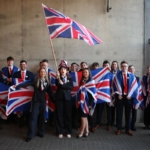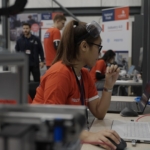Wasn’t it great to see Mo Farah winning yet another gold this past week? Yet again, he found that extra yard when he needed it most to hold off the competition and his many hours of training delivered the result we all expected, but which was by no means guaranteed. Mo won, yes, because he was the best, but also because he prepared to win. It’s this mindset and inspiration that Team UK will be taking with them to WorldSkills Abu Dhabi – the ‘skills olympics’ – in two months’ time.
We’re often told ‘life is a race’ and, whilst like any cliché there’s some truth in this, a key principle of any race is that everyone starts from the same place and everyone has an equal chance of winning. However, we were reminded again this week that the reality is much more complex than this. Research from the Resolution Foundation highlighted some quite stark disparities in income levels between different ethnic groups in the UK. Typical Bangladeshi and Pakistani households earn over £8,000 less than white British households; for black African households the figure is just over £5,000. The findings are yet another reminder of the inequalities that people from black, Asian and minority ethnic (BAME) backgrounds face in the UK. This comes on the back of research last month from the Chartered Management Institute that highlighted how fewer than one in 10 management roles are held by those from BAME backgrounds and that a relatively low proportion of the FTSE100 were actively championing diversity.
This is simply not good enough. The UK is a diverse nation with a population made up of a rich variety of ethnic backgrounds. Only through all ethnicities playing a full and active part in national life will we achieve everyone’s potential. It’s why I said within my first week as CEO that WorldSkills UK needed to do more to improve its diversity. As an organisation working with young people to help them fulfil their potential and ultimately represent the UK on the world stage, we have an absolute responsibility to do this. It’s why we are working with the Government as a member of the Apprenticeship Diversity Champions Network to increase BAME participation in apprenticeships to 20% by 2020. We’re also proud patrons of the BAME Apprenticeship Alliance which is doing much to break down barriers and change perceptions to ensure the 20% target is achieved. Currently, the figure is just over 10%, so there is much work to do for us all. We at WorldSkills UK are committed to increasing BAME participation at all levels across our activities and there is a lot to do.
I see role modelling as one of the key ways in which WorldSkills UK can make a major contribution. Frankly, we need more Mo Farahs in the world of skills competitions. The power of seeing someone from the same background as you being successful can’t be underestimated. It makes it that much more real and creates that greater sense of aspiration. We’ve got some amazing young BAME role models already: Danny Hoang was a member of Team UK at WorldSkills Sao Paulo and is now working at a top New York restaurant; Elizabeth Forkouh will be the first BAME competitor to represent the UK in her skill at WorldSkills Abu Dhabi and has already secured a dream job at the world-famous Gleneagles Hotel; and Yogi Raghvani has inspired hundreds of young people with his story of setting up his own web design business by going into schools and giving a fresh perspective on where apprenticeships and technical careers can take you.
By giving more young people from BAME backgrounds the opportunity to take part in skills competitions, we will be helping more young people get a better start in work and life. And, of course, there will be a greater pool of talent for WorldSkills UK to draw on, which will ultimately lead to BAME representation in Team UK increasing too. I want all young people from all ethnic backgrounds to start from exactly the same place on the line. There is a lot to do, but working together we can make this a reality.


